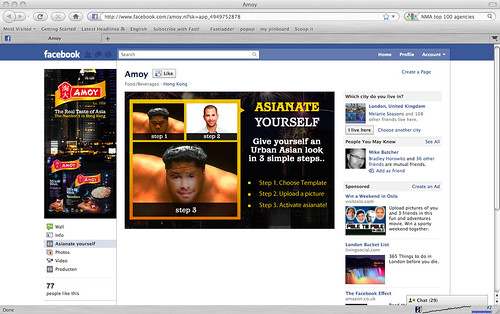Pepsi cola
PepsiCo Gives Pepsi-Cola a Renewed Marketing Push – WSJ.com – You just can’t go dark on brands and expect them to hold their value (paywall). At a corporate level PepsiCo had tried to focus more on functional / healthy foods and so had under invested in Pepsi cola as a brand. Market share depends on market penetration and relative share of voice so keeping a steady investment in Pepsi cola would have made more sense, even if the ‘social good’ points aren’t earned. By comparison, Pepsi cola main competitor
Ideas
Phys Ed: The Science of Toning Shoes – NYTimes.com – is it about whether they work, or encourage people to exercise?
Innovation
Did Microsoft steal the Kinect? – Hack a Day – or is it like the light bulb which had about 8 inventors at the same time
Nice try, Amazon: ‘One-click’ payment too obvious to patent • The Register
TECHNOLOGY REPORT » Artificial Intelligence Pioneer Marvin Minsky on the current state of AI Research – a high tech research version of the ‘if you have a hammer, every problem looks like a nail’
Japan
Japan’s attention to detail is all in the delivery | The Japan Times Online – since security is no longer guaranteed, fun is a key decider in roles
London
Afternoon Tea – Japanese tourists love it apparently
Luxury
Prada Woos Young Chinese With Sister-Brand Miu Miu – WSJ
Only In China: Paper Gucci Insert Causes Vogue China Buying Frenzy « Jing Daily – shows the power of the brand, however does this dilute the brand for purchasers?
Watches Are Rediscovered by the Cellphone Generation – NYTimes.com – an interesting article. Watches aren’t only about what information they convey to the wearer, but also what they say to other people. I remember reading an article about stainless steel Seiko analogue watches being popular with Japanese job hunters who wanted to convey that they were punctual
Security
Microsoft admits Patriot Act can access EU-based cloud data | ZDNet – Can Microsoft guarantee that EU-stored data, held in EU based datacenters, will not leave the European Economic Area under any circumstances — even under a request by the Patriot Act? – This screws US technology sales in a number of areas
Software
Why Microsoft’s ‘single ecosystem’ for PCs and tablets carries huge risks | guardian.co.uk – unified user experience just isn’t going to cut it across the different user contexts
Judge finds HTC guilty of infringing two Apple patents; could mean trouble for Android
Amazon’s Appstore problems run deep: a developer speaks out | ExtremeTech – interesting that Amazon has had problems
Telecoms
I, Cringely » The enemy of my enemy – Bob Cringely on Google’s next likely move after losing the Nortel patent portfolio to an alliance of its enemies – RIM and Ericsson together put up $1.1 billion with Ericsson getting a fully paid-up license to the portfolio while RIM, as a Canadian company like Nortel, gets a paid-up license plus possibly some carry forward operating losses from Nortel, which has plenty of such losses to spare. For RIM the deal might actually have a net zero cost after tax savings, which the Canadian business press hasn’t yet figured out. Microsoft and Sony put up another $1 billion. There is a reportedly a side deal for about $400 million with EMC that has the storage company walking with sole ownership of an unspecified subset of the Nortel patents. Finally Apple put up $2 billion for outright ownership of Nortel’s Long Term Evolution (4G) patents as well as another package of patents supposedly intended to hobble Android.


